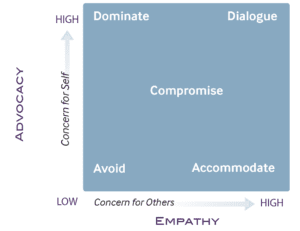What does conflict mean to you? Disagreement, opposition, argument, antagonism?
Is it something you relish or avoid? Healthy conflict in a trusted environment leads to constructive debate and can enable your company to achieve greater productivity, profitability, and ultimately be a more satisfying place to work. Healthy conflict builds cohesive teams.
The problem is that many leaders and company cultures don’t foster healthy conflict. Animosity, distrust, and active disassociation are obvious signs that cross functional communication will lead to trouble conveying value to your customer. But what about silence? If your employees, teams, leaders don’t feel safe voicing differing opinions or perspectives, your company’s success is what will suffer.
CASE STUDY

Improving Leadership Success
After taking over as President and COO of Sanborn Head in 2015, Mr. Cole contacted Liddell Consulting about providing supervisory training to enhance an employee engagement program Sanborn Head was developing. Liddell Consulting worked with him to customize a training program to help Sanborn Head’s supervisors develop specific leadership, supervisory, and communication skills… READ MORE
READ MORE
 Understanding your current conflict style can help you improve how you handle conflicts. Certainly personality type and work styles come into play. Some degree of understanding the other point of view and standing up for your own is necessary in any conflict.
Understanding your current conflict style can help you improve how you handle conflicts. Certainly personality type and work styles come into play. Some degree of understanding the other point of view and standing up for your own is necessary in any conflict.
The five conflict resolutions styles are useful in different situations — avoid, dominate, accommodate, dialogue, and compromise. Each falls on a scale of advocacy and empathy. And each has a distinct use.
5 Conflict Resolution Styles
AND WHEN TO USE THEM
Avoid “Avoiders” try to stay out of trouble, defer confrontation, escape responsibility, or buy time.
- When an issue is trivial or unimportant
- When it is out of your influence and control
- When relationship damage will outweigh benefits of resolution
Dominate “Dominators” go beyond advocating their own rights, seeking to win their position at all costs, or at the expense of others.
- On the few very important issues
- In emergencies, for quick, decisive action
- To protect yourself from those who take advantage of nice guys
Accommodate “Accommodators” try to support others, harmonizing and avoiding confrontation or disruption, but they often harbor feelings of anger over not meeting their own needs.
- When preserving the relationship is most important
- When you are wrong, or others’ ideas are better
- When you have already lost the battle
Dialogue “Dialoguers” collaborate and problem solve with others, and are tough about seeking mutually beneficial outcomes.
- When you need to learn and understand others
- When you want to integrate the synergy of different viewpoints
- When you need to find a win/win solution on important issues
Compromise “Compromisers” try for incremental progress, seeking little wins and little concessions.
- When you need to temporarily settle complex issues
- To find a workable solution under time pressure
- To break power struggles and take positive small steps forward

Learn More about Building a Great Team
Start Your Journey to Success
We’re ready, are you?
We know that every company has a unique set of challenges. Our perspective can help simplify what needs to be improved and our time-tested methods can provide clear steps toward your performance goals. Contact Liddell today.


